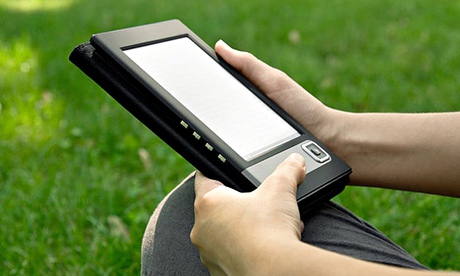
Amazon has accused the publisher of JK Rowling and Ian Rankin of handing "too small a portion" of the revenue from ebooks to authors as it retaliated in a dispute that has pushed the fraught relationship between book firms and the world's largest online retailer to a new low.
Amazon and Hachette, the fourth-biggest publisher in the US, have been locked in an angry row over ebook pricing, which has seen the online retailer remove pre-orders and slow deliveries for some of the French book firm's best-selling authors.
It had been reported that Amazon had been demanding 50% of the ebook price as its cut from any sale. But on Wednesday, writing on its kindle forum website, the company said it was happy with its 30% cut but believed Hachette should take less money and give more to its writers.
But authors dismissed the latest twist in a dispute that has seen the world's largest bookseller accused of "thuggish behaviour" as a PR stunt, arguing that slashing the price of ebooks could devalue their work.
Months after Amazon started penalising Hachette's biggest names, who also include David Baldacci, David Foster Wallace and JK Rowling's crime alter ego Robert Galbraith, the company set out a proposal for a new way of selling ebooks. It will continue to take a 30% share of the cover price of ebooks, with publishers and authors sharing the rest.
Currently, Hachette takes 70%, giving 25% of that to the authors, which is equal to 17.5% of the whole. However, under its proposals Amazon will no longer carry the whole cost of discounting as it does now. In return, readers will have cheaper ebooks and sales of electronic formats will increase, the company claimed.
"Ebooks can and should be less expensive," said a blogpost signed by the Amazon books team. "Keep in mind that books don't just compete against books. Books compete against mobile games, television, movies, Facebook, blogs, free news sites and more. If we want a healthy reading culture, we have to work hard to be sure books actually are competitive against these other media types, and a big part of that is working hard to make books less expensive."
Amazon has been accused of using authors as "cannon fodder" and "human shields", after it removed pre-orders of Hachette books, slowed their delivery and removed its usual discounts from the titles in the US. These actions have alienated authors, with Stephen King, Donna Tartt and Paul Auster among the 900 writers who have signed a letter asking for the dispute to be resolved without hurting authors.
Amazon said: "We believe 35% should go to the author, 35% to the publisher and 30% to Amazon. Is 30% reasonable? Yes. In fact, the 30% share of total revenue is what Hachette forced us to take in 2010 when they illegally colluded with their competitors to raise ebook prices. We had no problem with the 30% – we did have a big problem with the price increases."
In America, the typical ebook sells for $14.99 (£8.86), which Amazon says is unjustifiably high. The online retailer then reduces that price by paying for the discount out of its own 30% cut. It claims it could sell 1.74 times as many copies of the average book if the price were lowered to $9.99.
Responding to Amazon's post, the writer Roxana Robinson, who is president of America's Authors Guild, said: "Amazon is using PR to try to sway public opinion. I don't feel it is to writers' benefit in the long term to start devaluing the product. Not every book is going to sell that much more if you drop the ebook price. There is not an infinite demand for books."
Ebooks cost less to produce than hardbacks, with no printing, distribution or storage expenses. But Robinson says ebooks sell much better if the title is also available in print, so that the costs of producing a digital title cannot be separated from the overall investment in publishing and promoting a particular work.
In the UK, the Society of Authors' general secretary, Nicola Solomon, said it was time for authors to receive a bigger cut from ebook sales, but she cautioned against the retailer's proposals. "Amazon sets out some fascinating figures, but the discussion about percentages could blind one to the fact that they are trying to pressure Hachette into accepting a lower price for each book – they are asking Hachette to pay for Amazon's discounting decisions. Amazon are treating this like they treat other commodities, but books are not like that. You can't switch authors like you switch washing powder."
Philip Jones, editor of the Bookseller, said Amazon was seeking a "complete reversal" of how contracts currently work, whereby the publisher sets the wholesale price and the retailer takes the hit on any discount. "Amazon wants to out-price all its competitors, while creating a buffer around its own earnings. What we are seeing here is huge land-grab, on the terms side, but also over who has control over the wider book business."

